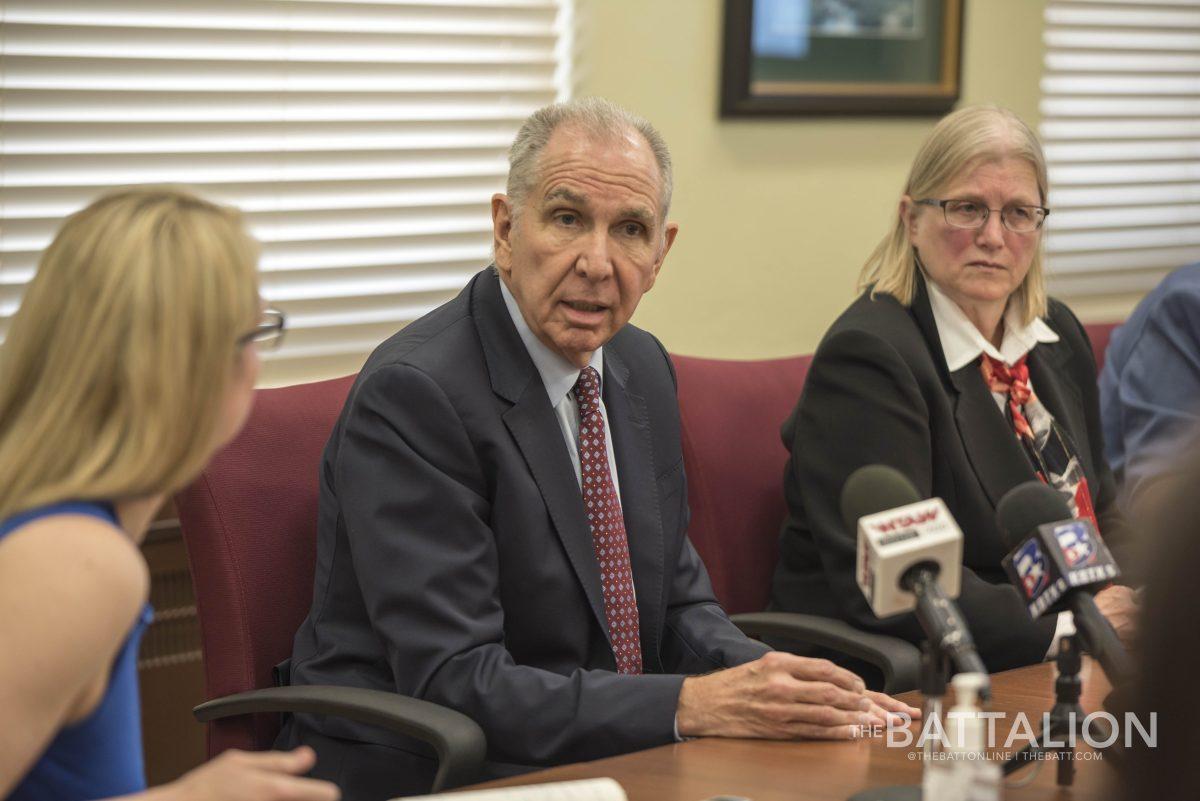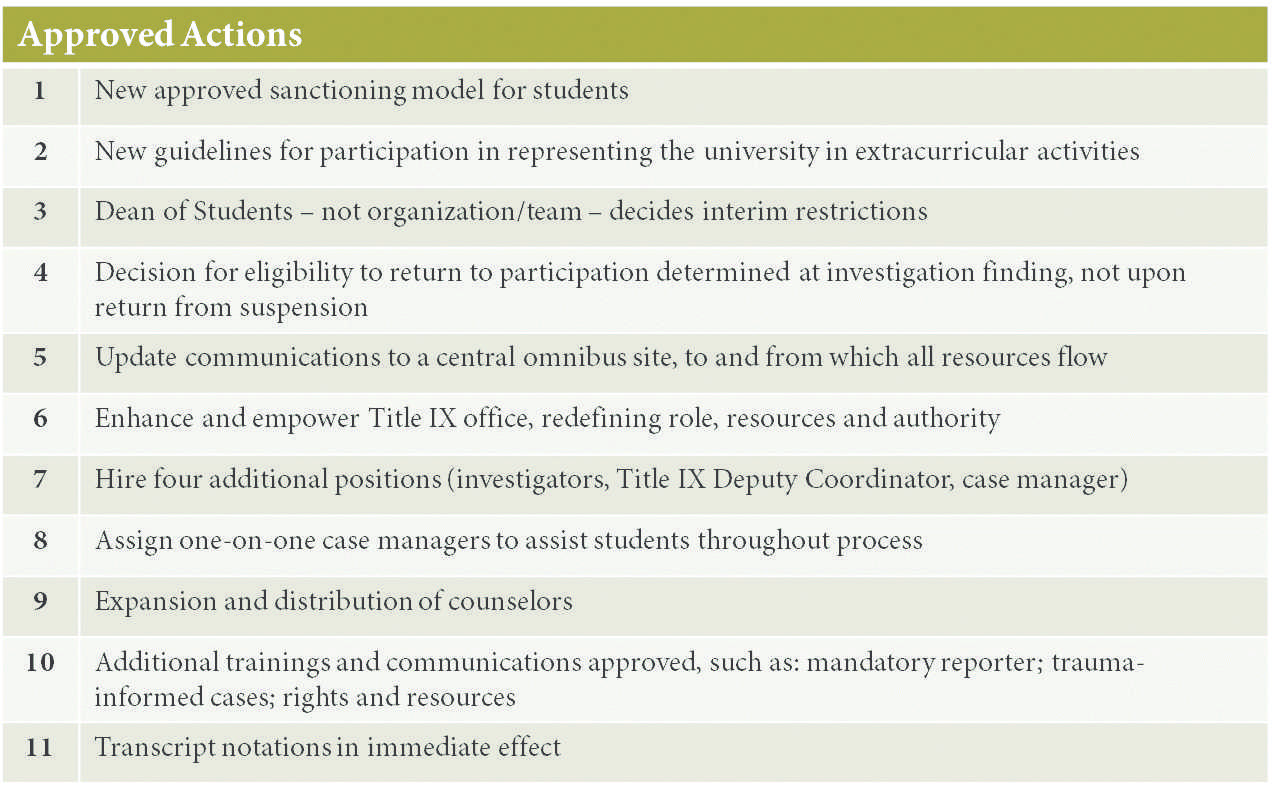University President Michael K. Young recently approved 11 actions aimed at improving procedures and resources involved in Title IX sexual misconduct cases.
Announced on Aug. 20, the actions are based on recommendations from internal and external investigations into the university’s handling of such cases. The investigations were launched after survivors of sexual assault brought their experiences to light this summer, many calling for a more supportive process for survivors and increased accountability for students found responsible for sexual misconduct.
Two internal committees comprised of undergraduate and graduate students, faculty and staff, and members of local advocacy organizations provided the president with recommendations that resulted in nine of the 11 actions. New reporting guidelines designed to limit the number of times a survivor must recount a painful or traumatic experience are among the actions taken.
Dr. Robin Means-Coleman, vice president and associate provost for diversity, co-chaired the first committee, which examined the student experience throughout the Title IX investigation process. She said the previous procedures often required survivors to retell their story multiple times throughout the reporting process.
“What is a strength is also complicated and that is we have a number of intake points where one can report what has happened to them…” Means-Coleman said. “That might be through counseling services, it might be a faculty member, it might be a roommate. We worked hard to then talk about how many times does a survivor have to tell their story? How can we make that more comfortable and trauma-informed for a survivor?”
The second internal committee, chaired by vice president for student affairs Daniel Pugh, made recommendations on student sanctions and eligibility for participation in extracurriculars. The committee made it clear in a summary of their recommendations that representing the university in extracurricular activities is a ‘privilege’ not a ‘right.’” The president’s actions call for A&M’s dean of students, not an organization or team, to decide any necessary interim restrictions. Additionally, decisions for eligibility to return to participation in extracurricular activities will be made when the findings of an investigation are presented, not when a student returns from suspension.
Pugh’s committee also developed a detailed new sanctioning model for students, laying out maximum and minimum consequences for students found responsible for various types and levels of sexual misconduct.
Remaining actions based on the internal committees’ recommendations include improved access to counseling services, a streamlined, central website for resources and communications about investigations and required notations on transcripts of students suspended, dismissed or expelled as a result of Title IX cases.
“We feel part as our responsibility, even to other institutions and students at other universities to ensure that if there are determinations made and concluded, that that’s actually noted on the transcript of the involved student so that people can be aware of that if there are attempts to transfer and move on…” Young said.
Higher education law firm Husch Blackwell was hired to conduct an external review, producing a 23-page report that examined existing university policies and provided recommendations about new ones. As a result, Young approved enhancements to the Title IX office, redefining its role and introducing additional resources and authority. A Title IX deputy coordinator, a case manager and two investigators will be hired to support the Title IX office. Employees required to report violations will be taking additional training courses.
At a press briefing, university officials spoke about their plans to move forward with the 11 actions and outlined additional future steps. The university will explore more resolution models, launch an implementation task force to ensure policies are enforced and establish benchmarking considerations aimed at making sure Texas A&M University is a national leader in Title IX policy. Plans also include a faculty and staff sanction task force to examine guidelines for sexual misconduct cases involving faculty and staff members.
Provost & executive vice president Carol Fierke said it’s crucial to keep the university’s core values in mind when handling sensitive situations and working to maintain the safety of students.
“The most important thing is that we, the leadership and everyone at Texas A&M must continue to aspire to live our Aggie core values in all that we do and all that we are,” Fierke said. “Our primary concern is the safety and ability for all of our members of our community to thrive on campus and so that is really our goal moving forward.”
Young’s full statements, along with links to the internal and external reports, are available online at president.tamu.edu. To learn about options for reporting sexual misconduct, visit urc.tamu.edu/title-ix.
New actions against sexual assault
August 26, 2018
Photo by Photo by Cassie Stricker
University President Michael K. Young addressed the new Title IX actions at a media briefing on Aug. 20.
0
Donate to The Battalion
Your donation will support the student journalists of Texas A&M University - College Station. Your contribution will allow us to purchase equipment and cover our annual website hosting costs.
More to Discover










